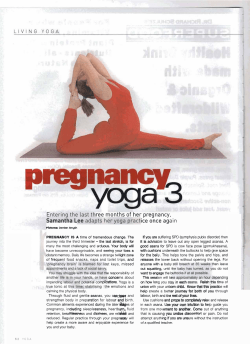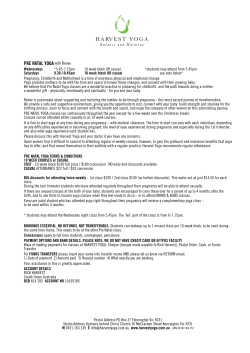
Sample Business Plan for Opening a New Yoga Studio Executive Summary
Sample Business Plan for Opening a New Yoga Studio Executive Summary Hatha Yoga is an ancient discipline that explores, develops, and integrates the body, mind, and spirit. Yoga systematically stretches and strengthens muscles throughout the body, increases circulation to internal organs and glands, quiets the nervous system, and improves concentration. This ancient system of self-care brings vitality, health, deep relaxation, and peace of mind. The style of Hatha Yoga taught is the Anusara method. Anusara Yoga is a new style of yoga that is heart-oriented, spiritually inspiring, yet grounded in a deep knowledge of optimal body alignment in the poses. Instructors encourage students to listen to their body, respect its wisdom, and to progress at their own pace. Deep relaxation is taught in each class after completion of the postures. The intention of the instructors at Garden Way Yoga Center (GWYC) is to assist students in the development of physical, mental, and spiritual well-being: a truly priceless health advantage. The Garden Way Yoga Center offers classes throughout the year and monthly workshops. Courses offered include Anusara-style Hatha Yoga plus workshops in related topics. The Yoga Center features well-trained, professional instructors, progressive teaching methods, a non-competitive and encouraging atmosphere, and a beautiful light-filled facility. The Garden Way Yoga Center also has a boutique that will sell workshop clothing and yoga training aides. John Smith, Ph.D., founder of The Garden Way Yoga Center, is one of Anusara Yoga's leading teachers. He conducts workshops and teacher trainings nationally, and has previously established yoga training centers in Santa Barbara, CA; Denver, CO; and Charlottesville, VA. He co-founded and codeveloped the Portland Yoga Center in Portland, OR, which offered instruction to nearly 1,000 students per week. He has been a yoga practitioner since 1985 and a meditator since 1989. John is a certified Anusara instructor and one of the few Designated Teacher Trainers in the Anusara style of Hatha Yoga. He is registered with the national Yoga Alliance at the highest 500-hour level. 1.1 Objectives The objectives of Garden Way Yoga Center are the following: • Acquire 300 customers by the end of the first year of operation. • Achieve sales in excess of $60,000 from the boutique. • Increase customer base by 25% by the end of the second year of operation. • Increase sales by 15% by the end of the second year of operation. 1.2 Mission The mission of Garden Way Yoga Center is to give the student, whether a beginner or advanced a place to practice Anusara. It is our intention to keep the teaching of Anusara as close to the way we have been taught as possible. It is incumbent for the teacher to always act responsibly and with the student's interest in mind. No matter what we learn or from whom we learn the real and only teacher is within. Company Summary The Garden Way Yoga Center offers Anusara-style Hatha Yoga plus workshops in related yoga topics. The Yoga Center features well-trained, professional instructors, progressive teaching methods, a non-competitive and encouraging atmosphere, and a beautiful light-filled facility. GWYC will be located in the commercial downtown section of City, in the renovated City Center. GWYC's goal is to build a large base of yoga students from the thousands of office workers that are employed downtown. Besides the training, the Garden Way Yoga Center also has a boutique that will sell workshop clothing and yoga training aides. GWYC will operate as a limited liability corporation. The company is owned by John Smith. 2.1 Start-up Summary The start-up expenses for the The Garden Way Yoga Center are focused primarily on studio setup, equipment, and inventory for the boutique and bookstore, as well as initial advertising and website set up. John will invest $60,000. In addition, GWYC will secure a $20,000 long-term loan. Start Up Requirements Start Up Expenses Legal $1000 Stationery, etc. $ 400 Brochures/Website/Advertising $10,000 Insurance/Business Licenses $2,000 Rent (first/last) $4,000 Equipment/Renovation $20,000 Total Start Up $37,400 Start Up Assets Cash Required $30,000 Start Up Inventory $10,000 Total Assets at Start Up $40,000 Total Requirement (Assets/Expenses) $77,400 2.2 Company Locations and Facilities The Garden Way Yoga Center is located in downtown City, in the renovated City Center. The facility is quickly accessible to the over 50,000 urban professionals that GWYC considers potential members. With two studio rooms, men and women's dressing rooms, and a boutique, GWYC offers plenty of floor space for multiple classes being conducted simultaneously. In addition, parking is not a problem. GWYC is within easy walking distance from any building in the downtown area. If a customer does decide to drive, the City Center has parking space for up to 2,000 vehicles. Products and Services The Garden Way Yoga Center's services and products are as follows: Services • Yoga 1/Beginner is an introductory class for students who are new to Yoga. This class focuses on poses to stretch and strengthen the legs, back, and shoulders. Emphasis is given to the basic alignment of the standing poses. • Fundamentals of Vinyasa Yoga will prepare students for a vigorous flow style of yoga (Vinyasa) that synchronizes breath with movement. It will offer a balance of strength, flexibility, and endurance to challenge the fitness enthusiast. The course will begin with instruction on the alignment of the poses and move toward linking all the poses together in a continuous flow by the end of the session. • Gentle Yoga is designed for those who prefer a class less vigorous than Yoga 1. It includes gentle stretches and breathing as well as simple movements designed to systematically increase the range of motion of every major joint and increase energy. This class is ideal for students with chronic symptoms such as muscle/joint pain, stiffness, weakness, or fatigue, or who is looking for a very relaxing practice. • Yoga 1-2/Continuing Beginner is a continuation class for Yoga 1. The emphasis of this course is on refining and building endurance in Yoga 1 and Yoga 2 standing poses. It does not include the shoulder stand. The basic Anusara Yoga principles of alignment are presented. This class is suitable for students who have practiced other styles of yoga, but it is not suitable for those who have never studied yoga before. • Yoga 2/Intermediate focuses on refining the standing poses and learning basic sitting postures, simple back bending poses, and the shoulder stand using the Anusara Yoga principles of alignment. It is recommended that students complete both Yoga 1 and Yoga 1-2 before taking Yoga 2. • Yoga 3/Advanced continues with refinements to poses studied in Yoga 2 and introduces full arm balance (handstand), headstand, and forearm balance. Additional back bend poses are included. Regular yoga practice outside of class is strongly encouraged. Permission of the instructor is required. Products • Workshop Clothing: Shirts, shorts, athletic bras and pants. • Workshop Equipment: Balancing balls, straps, blocks, mats, and mat bags. • Yoga training aides: Video tapes, instructional manuals, inspirational books. Market Analysis Summary Downtown City has emerged from the recent recession to regain it position as the heart of the city. The growth has been fueled by the increased employment in the city's high tech companies. Currently, 50,000 professional work in downtown City. We believe that a yoga center can be very attractive to our customers if we create a program that fits the time constraints of their jobs. Our location is within easy walking distance from most office buildings downtown. We plan to offer our members a program that will allow them to use their lunch hours to attend workshops. John Smith will be a positive draw for those who have some experience with yoga instruction. The key to the success of GWYC will be attracting new people to yoga instruction. 4.1 Market Segmentation The Garden Way Yoga Center will focus on two customer groups: Middle Income Urban Professionals: This group is the core segment of potential students of GWYC. Their demographic characteristics are the following: • Ages: 26-40. • Sex: 30% male, 70% female. • Family Income: $30,000-$70,000. • Health/Lifestyle Issues: Active individuals who are focused on healthy food and dieting. Over 70% of people in this group are members of gyms. Approximately, 40% of potential customers have taken yoga classes before. • Social Pattern: Will more likely attend as part of group. • Center's selling point: Close to work. The session lowers stress. Can be attended with workmates as group activity. Upper Income: The upper income customer is a secondary target group. Their demographic characteristics are the following: • Ages: 35-60. • Sex: 30% male, 70% female. • Family Income: $80,000+. • Health/Lifestyle Issues: Active individuals who are focused on healthy food and dieting. Over 90% of people in this group are members of gyms. • Social Pattern: Will more likely attend alone. • Center's selling point: Close to work. The session lowers stress. 4.2 Target Market Segment Strategy Everything GWYC does must be tailored to work within the time constraints of the target customer. Yoga classes can be no longer than 45 minutes during the weekdays and must be scheduled to fit the break and rolling lunch schedules that exist in the downtown businesses. Evening and early morning classes will be longer (1-1.5 hour). The focus of the instruction will also have to be tailored to a clientele that will be seeking maximum relief from the pressure of work and then returning to the workplace. If GWYC can create a noticeable difference in the customers' sense of well-being, then the customer will come to depend on instruction as a escape during the day. These kinds of experiences will create a tremendous word of mouth and bring in more first time students. 4.3 Service Business Analysis Typically, yoga centers are located away from the city's commercial/business center. GWYC is less focused on serving a large number of beginners and is more focused on obtaining long term students. Students are attracted to a specific type of yoga and the reputation and skills of GWYC's leader. 4.3.1 Competition and Buying Patterns The key to competition within the yoga business is the quality of the instructor. There are a number of instructors around City who are well respected, and Garden Way Yoga will strive to attract these teachers to its facility. The location, quality and ambiance of the facility is the real competitive advantage for Garden Way. Because it has the best most attractive facility in town teachers will want to teach here and clients will want to "get away" here. Garden Way Yoga Center will focus of presenting GWYC as the perfect place to learn yoga skills that will improve the student physically and reduce the daily stress of the work world. Other "schools" in the area will be able to match the quality of instruction, but are often held in church halls, community centers, fitness centers, etc. and do not have the relaxing ambiance that is so important to the discipline. Strategy and Implementation Summary The Garden Way Yoga Center will market through the numerous downtown fitness clubs, beauty salons, tanning salons and boutiques, as well as through a prominent social networking presence. The Garden Way Yoga Center will offer the free open workshop for beginners. In addition, GWYC will initiate a program that will give 25% session discount to members who successfully recruit new members to GWYC. 5.1 Competitive Edge The competitive advantage of Garden Way Yoga Center is location and the quality and ambiance of the facility. Based in the heart of City, we offer our members excellent instruction that fits into their busy day, providing them a sanctuary from daily pressure. Our facility is a perfect compliment to our brand image. 5.2 Sales Forecast The sales forecast outlines sales of instruction time as well as sales of products through the boutique located in the facility. Instructions is sold in the following four ways: • Private lessons; • Ten class passes; • Drop-in sessions; • Monthly memberships. The boutique will sell clothing, books, posters, books, DVDs and videos, mats, and other props for yoga. In addition it will sell healthy pre-bottled drinks and healthy energy food. In the beginning all food will be pre-packaged, since John does not have the facility or expertise to run a cafe facility. If the facility becomes more of a destination, he will research adding a cafe. The Garden Way Yoga Center anticipates that sales will be slow for the first and second month of operation. After that point, sales will increase as membership grows. The following is the sales forecast for three years. Sales Forecast Year 1 Year 2 Year 3 Yoga Instruction 152,000 190,000 240,000 Boutique Sales 64,000 85,000 106,000 Other 0 0 0 216,000 275,000 346,000 20,150 26,000 32,000 Sales Total Sales Cost of Goods Sold Boutique Sales Year 1 yoga instruction sales estimate is based on 20 classes per week with an average of 9 students per class, plus monthly workshops. 5.3 Milestones Milestones are important program goals with dates and managers in charge, and budgets for each. The milestone schedule indicates our emphasis on planning for implementation. Our business plan includes complete provisions for plan-vs.-actual analysis, and we will be holding follow-up meetings every month to discuss the variance and course corrections. 5.4 Marketing Strategy The key to the marketing strategy is to get the downtown lunch traffic off the streets and into GWYC. GWYC will offer free instruction and will have refreshment available for visitors. The instruction segments will be 45 minutes and focus on exercises that will produce the maximum release of tension. Personnel Plan John Smith, Ph.D., founder of The Garden Way Yoga Center, is one of Anusara Yoga's leading teachers. He conducts workshops and teacher trainings nationally and internationally. In addition he has excellent business experience having previously established yoga training centers in Santa Barbara, CA; Denver, CO; and Charlottesville, VA. He co-founded and co-developed the Portland Yoga Center in Portland, OR, which offers instruction to nearly 1,000 students per week. He has been a yoga practitioner since 1985 and a meditator since 1989. John is a certified Anusara instructor and one of the few Designated Teacher Trainers in the Anusara style of Hatha Yoga. He is registered with the national Yoga Alliance at the highest 500-hour level. John was the business manager at Portland Yoga Center. PYC started with four employee and 20 students. Within three years, PYC had a staff of 25 and over 1,000 students. He was an effective manager of the growth of Portland Yoga Center. The Garden Way Yoga Center's personnel will be the following: • John Smith, director; • Teachers (5 half-time); • Administrative staff (1). Personnel Plan Year 1 Year 2 Year 3 Director (self) 40,000 42,000 48,000 Teachers (4 part 58,000 65,000 75,000 Admin Staff 19,000 22,000 25,000 Total Personnel 117,000 129,000 148,000 time) Determine Monthly Break Even Point Estimated Monthly Fixed Costs = $15,500 Average Percent Variable Costs = 10% Break Even = 15,500 + 1550 = 17,050 Projected Profit/Loss Below is a yearly profit/loss estimate. For monthly projections, you will usually project a loss for the first 6 months during the start up phase and then project profit increasing, but with a lull in the summer months. Profit and Loss Projections Year 1 Year 2 Year 3 Sales 216,000 275,000 346,000 Cost of Goods Sold 20,150 26,000 32,000 Total Revenue 195,850 249,000 314,000 117,000 129,000 148,000 7,500 7,800 8,200 Depreciation 2,500 2,600 2,900 Utilities/Rent 31,300 32,500 33,600 Insurance 2,400 2,500 2,600 Payroll Taxes (14%) 16,380 18.060 20,720 117,080 192,460 216,020 18,770 56,540 97,980 loan was used at start) 2,200 1,900 1,300 Taxes 4,140 13,560 24,170 Net Profit 12,430 41,080 72,510 Expenses Payroll Marketing/Advertising (not including start up) Total Operating Expenses Profit Before Interest and Taxes Interest Expense (if a
© Copyright 2025









